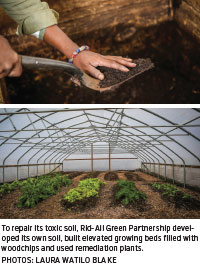By Chris Mosbey
Source: greenhousemag.com

Plants are frequently used to decorate landscapes, to accentuate and create green space. They are testaments to healthy soil and the care and attention their growers spend cultivating them. But in Cleveland, Ohio’s Kinsman neighborhood, they’re also a sign of a changing economy and the fight against food deserts. In some ways, they’re a symbol of the resilience of the neighborhood and its denizens.
Rid-All Green Partnership, an urban farm that takes aim at malnutrition in the Kinsman neighborhood, opened its doors in 2010. But before it could start growing though, the company had to test its soil. What they found was not merely unusable, but toxic.
For years, the empty space that eventually became Rid-All was used as a de facto dumping ground for all sorts of waste: industrial excess, car batteries, refrigerators, fuel and oil, common litter and discarded chemicals, among many other potential hazards. A public transportation train track runs along a hill above the farm and causes run-off to sift onto the grounds. Even the pond on the property was poisoned.
When Rid-All tested the soil it came back positive for dangerous levels of lead and mercury. Before the company could start growing produce, they’d need to fix the soil. That’s when they decided to explore phytoremediation, a technique that uses plants to extract heavy metals and chemicals from soil.
“Our goal was to bring this area back,” says Marc White, Rid-All’s farm manager. “We used remediation plants to do that.”
So in 2010, the company brought in wood chips, crafted its own soil (which it now sells under the label “Black Gold”), and created raised platforms for growing within their greenhouses. They surrounded their houses with plants with phytoremediation qualities. They even used remediation plants in their pond. Rid-All is now growing produce year-round and running nutrition and cooking classes at their campus.
And now that five years have passed, White says the farm is getting ready to remove their remediation plants, dispose of them properly with the help of the EPA, and re-test the soil. They’re confident that the toxic levels have been reduced dramatically.
White is also hoping that Rid-All will be able to start using hemp on the farm, a plant that he says will provide drastic remediation qualities for the soil. He’s been giving presentations lobbying for the use of the plant. He calls hemp a “hyper-accumulator” that’s capable of extracting lead, heavy metals, and even radioactive cadmium and cesium.
If cannabis is made legal in Ohio (the issue is potentially slated for a November 2016 ballot appearance), then White hopes he can begin employing hemp around the farm, accelerating the remediation process. If it’s not, he’s been happy with his progress so far, and is confident that, in time, the soil around Rid-All can be slowly cleansed.
No comments:
Post a Comment